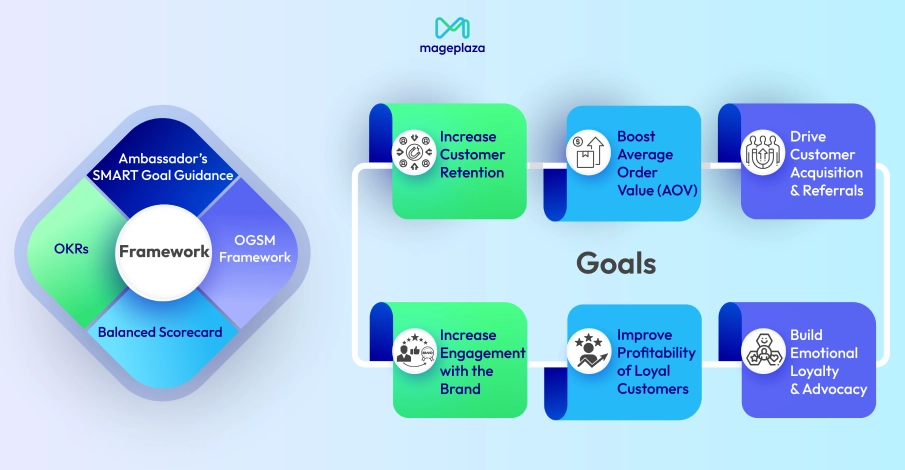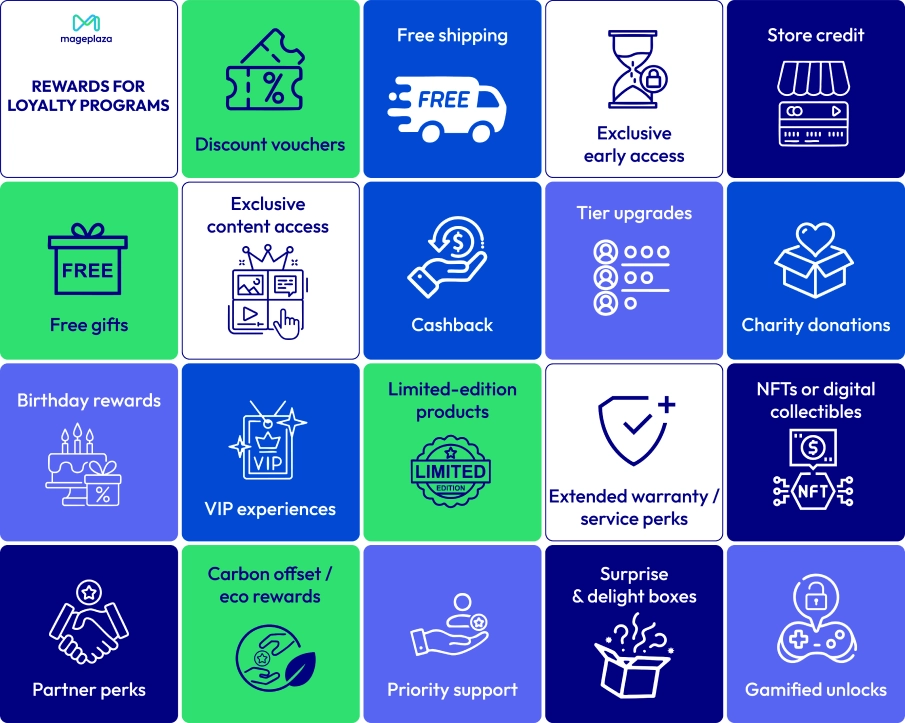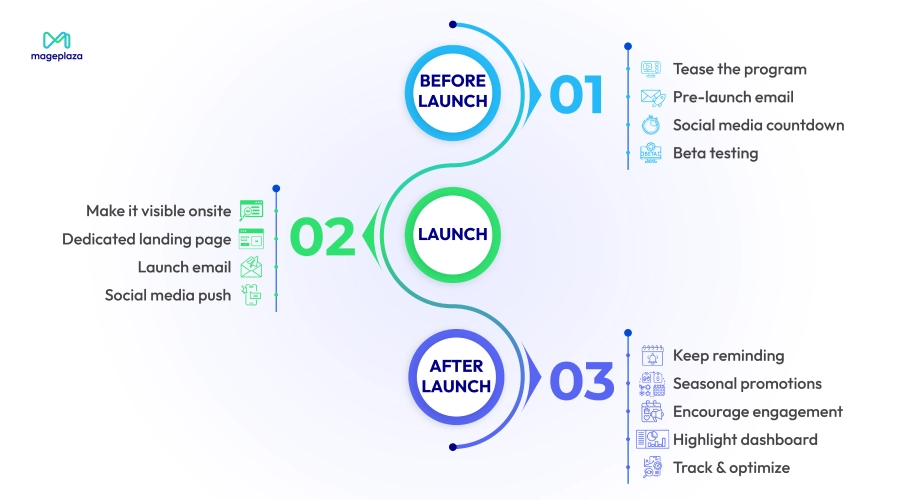Hyvä Theme is Now Open Source: What This Means for Magento Community - Mageplaza
Hyvä is now Open Source and free. Discover what changed, what remains commercial, how it impacts the Magento ecosystem, and how to maximize its full potential.

Key Takeaways
Thinking about launching a loyalty program but not sure where to start? Building an effective program is not only about discounts, but it also requires clear goals, the right model, attractive rewards, simple earning and redemption rules, strong promotion, and ongoing measurement.
In this guide, we’ll walk you through the key steps to create a loyalty program that truly drives retention and revenue. If you want a broader look at loyalty models and benefits, check out our full article on eCommerce loyalty programs.
Clear goals are the foundation of a successful loyalty strategy. Whether your aim is to improve retention, boost average order value, or increase referrals, setting measurable objectives and suitable metrics guides every decision. With a roadmap in place, you can focus on tactics that directly support growth.

Some popular frameworks to define goals:
Here are some common goals and metrics businesses use to measure their loyalty program success:
| Goal | Metrics to Track | Why It Matters |
|---|---|---|
| Increase Customer Retention | Repeat Purchase Rate Churn Rate Customer Lifetime Value (CLV) |
Shows if the program keeps customers coming back and increases their long-term value. |
| Boost Average Order Value (AOV) | AOV of members vs. non-members Upsell / Cross-sell Rate |
Measures whether loyalty incentives encourage bigger baskets or add-ons. |
| Drive Customer Acquisition & Referrals | Referral Rate Enrollment Rate Cost per Acquisition (CPA) |
Evaluates if the program helps attract new customers through referrals and sign-ups. |
| Increase Engagement with the Brand | Active Participation Rate Redemption Rate Net Promoter Score (NPS) |
Tracks how actively customers use the program and how much they enjoy it. |
| Improve Profitability of Loyal Customers | ROI of Loyalty Program Incremental Revenue from members % of Sales from members |
Confirms that the program generates more revenue than it costs to run. |
| Build Emotional Loyalty & Advocacy | NPS / Customer Satisfaction Scores Social Shares & Reviews Retention of top-tier members |
Captures deeper, emotional loyalty and advocacy beyond transactions. |
| Scalability | Flexible, but requires manual upgrades and resources to scale. | Scales easily with built-in features and extension updates. |
💡 Tips:
There’s no one-size-fits-all approach to loyalty. From points-based systems to tiered memberships and referral programs, each model serves different customer motivations. Choosing the right structure helps align rewards with your audience’s behavior and your business objectives.
Popular loyalty models in eCommerce include:
Read more: Ecommerce loyalty program types and more
💡 Mageplaza Reward Points extension for Magento 2 supports both basic features (earn & redeem points) and advanced rules (tiered structure, expiration policies).
The effectiveness of your program depends on how appealing the rewards are. Customers should feel excited about earning something valuable: whether it’s discounts, free shipping, exclusive access, or experiences. Pick rewards that truly matter to your customers, as when rewards align with customer desires, participation rates naturally rise.

Monetary Rewards
Experiential Rewards
Emotional & Value-Based Rewards
Relationship-Based Rewards
A loyalty program only works if customers clearly understand how to earn rewards and how to use them. No matter which model you choose - points, tiers, referrals, subscriptions, or cashback - the rules should always be transparent, simple, and motivating.
Keep it simple: Customers should instantly know what they get and how they earn it. Avoid complicated formulas or hidden conditions.
💡 Best Practices:
A loyalty program is only as strong as the system behind it. The right platform should be easy to set up, flexible to customize, and scalable as your business grows. Magento 2 merchants, for example, can benefit from dedicated extensions that simplify setup while offering advanced features.
Extensions or Plugins (best if you want in-platform control)
Best for: Merchants who want quick settings that fit the platform compatibility.
All-in-One Loyalty Platforms (cross-channel, SaaS-based)
Best for: Merchants who run multi-channel campaigns (Magento + social + email) and want advanced analytics.
CRM + Loyalty Integration
Best for: Agencies or larger merchants who need loyalty to tie into CRM, sales, and marketing automation.
Custom-Built Solutions
Best for: Businesses with complex needs and dev resources who don’t want to rely on 3rd-party SaaS.
💡 Recommendations:
Even the most generous program will fail if it’s difficult to use. Customers should instantly see how many rewards they’ve earned, what they can redeem, and how close they are to the next milestone. A clear, engaging interface keeps the program top-of-mind and encourages ongoing participation.
Keep in mind these tips for your loyalty program UI design:
💡 Mageplaza Reward Points Ultimate includes built-in UI elements that display points across the storefront, plus a customer dashboard for full transparency.
Creating a loyalty program isn’t enough, you need to spread the word. Promote it across your site, email campaigns, and social media to ensure customers understand and interact with the program. Prepare for continuous thorough promotion campaigns before launch, during launch, and after launch for continuous customer reminders.

Check what to do in each step and examples in the table below:
| Stage | What to Do | Example |
|---|---|---|
| Before Launch | Tease the program | Banner on homepage “A new way to earn rewards is coming soon.” |
| Pre-launch email | Send a newsletter to current customers “Get ready to earn points for every purchase starting next week.” |
|
| Social media countdown | Posts and stories on Facebook or Instagram to countdown to the launch date “3 days until your shopping gets more rewarding.” |
|
| Beta testing | Invite top 50 customers to join early and share feedback. | |
| Launch | Make it visible onsite | Homepage hero banner + pop-up “Introducing Reward Points – shop, earn, redeem.” |
| Dedicated landing page | Create a landing page explaining tiers and benefits How to earn points, redeem rules, and rewards available. |
|
| Launch email | “Start earning points today! Every $1 = 1 point. Redeem for discounts & free shipping.” | |
| Social media push | Facebook post with product mockup: “Earn 100 points = $5 off.” | |
| After Launch | Keep reminding | Order confirmation email shows: “You earned 50 points from this order.” |
| Seasonal promotions | Double points during holiday sales: “Earn 2x points this Black Friday.” | |
| Encourage engagement | Offer bonus points for writing a review or referring a friend. | |
| Highlight dashboard | In My Account: “You have 300 points – redeem now for $15 off.” | |
| Track & optimize | Review redemption rate, ROI, and adjust campaigns monthly. |
Using Magento 2?
Track performance to ensure your program delivers results.
Analytics & Tracking Tools
Customer Feedback & Survey Tools
Referral & Engagement Tracking Tools
Building a loyalty program is a long-term investment in your customers and your brand. When you define clear objectives, pick a model that suits your audience, and design rewards that feel valuable, you lay the foundation for stronger relationships and higher revenue. The real secret is to keep it simple, transparent, and adaptable so customers enjoy every interaction. Start shaping your program now, and watch as casual shoppers turn into loyal supporters who keep coming back for more.